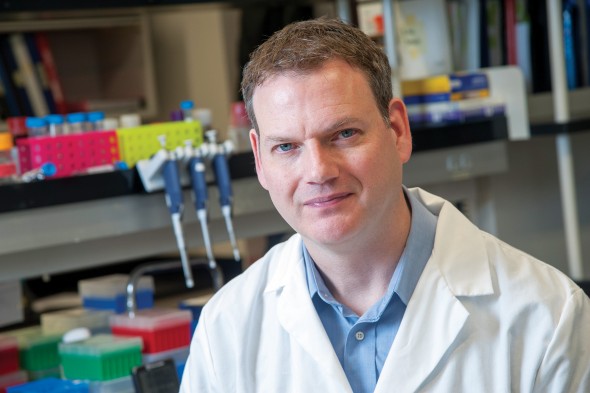Cancer biologist examines factors influencing fate of tumor cells

Douglas Thomas: “I’ve always been inquisitive in nature. I feel I’m making a small contribution to human health.” — Photo: Roberta Dupuis-Devlin
As a drama major in his first year of college, Douglas Thomas had no intention of following in his father’s footsteps. A biology course changed that.
The son of a renowned cancer epidemiologist, Thomas believed he was destined to perform on the stage. The biology course was so interesting, he left the acting program so he could devote his career to science.
“I’ve always been inquisitive in nature, and I love research,” Thomas said. “I feel I’m making a small contribution to human health.”
Thomas, a cancer biologist, and his colleagues have discovered a new role for nitric oxide, a gaseous signaling molecule crucial for intercellular communications and health. They found that nitric oxide plays an important role in epigenetics — external factors that turn genes “on” and “off.” Epigenetic changes do not directly modify gene sequences, but instead they affect how cells “read” the DNA.
Thomas, associate professor of medicinal chemistry, is the first to establish that nitric oxide determines the fate of tumor cells by controlling specific epigenetic pathways rather than through classical signaling mechanisms. While nitric oxide has been recognized as a significant contributor to cancer pathophysiology for many years, specific details to explain these associations have remained obscure. Thomas’ studies offer a unifying explanation that helps determine why nitric oxide exerts such a broad spectrum of effects on cancer etiology, both positively and negatively.
“Our next step is to learn how we can exploit these pathways in a tumor. And can we apply this information to develop novel therapeutic strategies to inhibit cancer progression?” Thomas said.
The research, Thomas said, has much broader implications than breast cancer treatment. Many other diseases that have a critical nitric oxide component may now be targeted for therapeutic gain.
Thomas is considered a pioneer in the field of nitric oxide and epigenetics. He has published numerous papers on the subject and over the past 24 months he has presented his work at meetings in England, Japan and China, as well as throughout the United States.
Since arriving at UIC eight years ago, he has been continuously funded through federal and association grants.
“I am really lucky to be in the company of so many talented and world-class researchers here at UIC,” he said.
He is also considered an outstanding mentor of numerous graduate students and postdoctoral research associates, preparing the next generation of cancer biologists.
While he did not become a scientist to receive accolades, Thomas said he is “humbly grateful to be the recipient of the Rising Star Award.
“I am really lucky to be in the company of so many talented and world-class researchers here at UIC. It’s really a great feeling to be recognized by your peers for your scientific contributions.”
